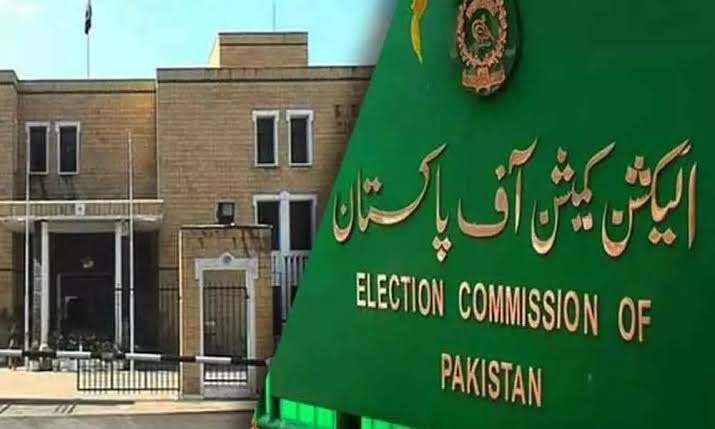Islamabad, 13 May 2024, (GNP): The Election Commission of Pakistan (ECP) temporarily halted the lawmakers who were elected on reserved seats that were withheld from the Pakistan Tehreek-e-Insaf (PTI)-supported Sunni Ittehad Council (SIC).
This action follows the Supreme Court’s decision last week to pause the Peshawar High Court (PHC) judgment regarding reserved seats, as it accepted the petition from the Sunni Ittehad Council (SIC) challenging the ruling.
The matter of reserved seats has been a source of dispute between the Sunni Ittehad Council (SIC), mainly consisting of independent candidates supported by Pakistan Tehreek-e-Insaf (PTI), and the governing parties, particularly Pakistan Muslim League-Nawaz (PML-N), the Pakistan Peoples Party (PPP), Muttahida Qaumi Movement-Pakistan (MQM-P), and others.
Numerous members from various parties such as PPP, PML-N, MQM-P, JUI-F, and others had sworn in on reserved seats in different assemblies nationwide following the PHC’s ruling.
The ruling party PML-N bears the brunt, with 44 of its members suspended. Additionally, 15 lawmakers from PPP, 13 from JUI-F, and one each from MQM-P, Istehkam-e-Pakistan Party, Awami National Party, Pakistan Muslim League, and Pakistan Tehreek-e-Insaf Parliamentarians have also been affected.
Following the directive from the Supreme Court, today, the Election Commission of Pakistan (ECP) revoked the notification of 22 elected candidates who were allocated seats in the National Assembly. Among these, 11 are female lawmakers from Punjab, 8 from Khyber Pakhtunkhwa, and 3 representing minority seats in the lower house.
Similarly, in the Khyber Pakhtunkhwa Assembly, 21 women lawmakers and 4 minority representatives have been stripped of their seats.
In the Punjab Assembly, 24 female lawmakers and 3 non-Muslim legislators have been affected. Meanwhile, in the Sindh Assembly, the commission has invalidated the seats of 2 female MPs and a minority member.
Notably, all the lawmakers who have been de-notified belong to various parties including PML-N, PPP, MQM-P, JUI-F, Awami National Party, Pakistan Tehreek-e-Insaf Parliamentarians (PTI-P), Pakistan Muslim League-Quaid (PML-Q), and Istehkam-e-Pakistan Party (IPP).
Supreme court’s order
Last week, the Supreme Court suspended the Peshawar High Court’s (PHC) verdict on reserved seats while accepting the plea from the Sunni Ittehad Council (SIC) against the high court’s decision.
The Election Commission of Pakistan (ECP) had previously dismissed the party’s plea, resulting in it being denied reserved seats.
During the hearing, Justice Mansoor Ali Shah stated, “[We are accepting the [SIC’s] pleas [against the PHC verdict],” questioning the legal basis for allocating seats to other parties.
A three-member bench led by Justice Shah, along with Justice Muhammad Ali Mazhar and Justice Athar Minallah, heard the SIC’s plea submitted through Advocate Faisal Siddiqui last month.
Supreme Court decided to prevent the members who had taken oath on reserved seats from participating in legislative votes until the case is heard. The court also announced that it will conduct daily hearings starting from June 3.
Additionally, the court clarified that the issue at hand pertains specifically to the extra reserved seats allotted to political parties later on.
Also Read: ECC has authorized a rise in Passco’s wheat procurement goal
Case in Peshawar High Court
In March, a five-member bench of the Peshawar High Court (PHC), led by then Chief Justice Ibrahim Khan and including Justice Ishtiaq Ibrahim, Justice Ijaz Anwar, Justice Arshad Ali, and Justice Shakeel Ahmad, dismissed the Sunni Ittehad Council’s (SIC) petition challenging the Election Commission of Pakistan’s (ECP) decision to deny it reserved seats.
The ECP had cited “non-curable procedural and legal defects and violations of mandatory provisions of the Constitution” as reasons for deeming SIC ineligible for reserved seats allocated to women and minorities.
While turning down SIC’s petition, the ECP accepted applications from opposing parties and decided to fill the seats in the National Assembly through a proportional representation process based on the parties’ electoral success.
Subsequently, the SIC approached the Supreme Court last month, urging it to allocate the party the 67 women and 11 minority seats in the National and provincial assemblies and overturn the PHC ruling.
The SIC’s argument asserts that reserved seats for women and minorities are distributed among parties in the national and provincial assemblies based on proportional representation, with no party entitled to more reserved seats than its representation warrants.

